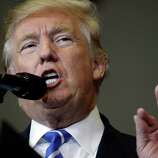This op-ed piece is a special To The Washington Post from Eric Chenoweth, the co-director of the Institute for Democracy in Eastern Europe.
In assessing Donald Trump's presidential victory, Americans continue to look away from this election's most alarming story: the successful effort by a hostile foreign power to manipulate public opinion before the vote.
U.S. intelligence agencies determined that the Russian government actively interfered in our elections. Russian state propaganda gave little doubt that this was done to support President-elect Trump, who repeatedly praised Vladimir Putin and excused the Russian president's foreign aggression and domestic repression. Most significantly, U.S. intelligence agencies have affirmed that the Russian government directed the illegal hacking of private email accounts of the Democratic National Committee and prominent individuals. The emails were then released by WikiLeaks, which has benefited financially from a Russian state propaganda arm, used Russian operatives for security and made clear an intent to harm the candidacy of Hillary Clinton.
From the Russian perspective, the success of this operation can hardly be overstated. News stories on the DNC emails released in July served to disrupt the Democratic National Convention, instigate political infighting and suggest for some supporters of Sen. Bernie Sanders (I-Vt.) - without any real proof - that the Democratic primary had been "rigged" against their candidate. On Oct. 7, WikiLeaks began near daily dumps from Clinton campaign chairman John Podesta's email account, generating a month of largely negative reporting on Clinton, her campaign staff, her husband and their foundation. With some exceptions, there was little news in the email beyond political gossip and things the media had covered before, now revisited from a seemingly "hidden" viewpoint.
Russian (and former communist) propaganda has traditionally worked exactly this way: The more you "report" something negatively, the more the negative is true. Trump and supportive media outlets adopted the technique and reveled in information gained from the illegal Russian hacking (as well as many "fake news" stories that evidencesuggests were generated by Russian intelligence operations) to make exaggerated claims ("Hillary wants to open borders to 600 million people!") or to accuse Clinton of illegality, corruption and, ironically, treasonous behavior.
Part of the Russian operation's success is that we cannot measure the effect. Did the DNC emails depress the Sanders vote for Clinton? Did the Podesta emails turn off independents? Would voters have responded differently if major media had reported the email releases not as legitimate news but as an intelligence operation by a hostile foreign power aimed at undermining the integrity of U.S. elections? There are no clear answers. But there are certainties: The email operation increased negative stories about Clinton, fueled an immense propaganda attack and diminished coverage of actual issues. The large polling lead Clinton gained after the debates slipped significantly under this barrage of negativity - even before FBI Director James B. Comey's bombshell.
Again, was there coordination with this foreign intervention? Russia's deputy foreign minister, Sergei A. Ryabkov,boasted that government representatives maintained multiple "contacts" during the campaign with Trump's "immediate entourage." (Campaign spokeswoman Hope Hicks issued a denial.) This is on top of reported U.S. government suspicions that a Trump adviser met with the intelligence operative directing the hacking. Where are the committee chairmen in Congress demanding an investigation? How is it that Republican Party leaders accept the intervention of a foreign power in the election of their party's presidential candidate?
Putin is pursuing large strategic goals: recognition of the annexation of Crimea and international acceptance of foreign aggression to change state borders; Russian control of Ukraine; weakening or even dissolution of the European Union and NATO; restoration of Russia as a great power; and restored dominance over the former Soviet bloc and its environs. In pursuing these aims, Putin is engaged in a disciplined effort to influence democratic politics in the West, including financial and propaganda support for the narrow Brexit victory and for a network of far-right (and pro-Russian) nationalist political parties and groups throughout Europe. Now he has achieved what had to have been his most improbable goal: helping elect a sympathetic U.S. president who wants to form an alliance against terrorism. What will Trump give in exchange? He has already reaffirmed his intention to end support for pro-Western rebels in Syria, which effectively gives Russia a free hand to make President Bashar al-Assad its satrap. The greater danger is Trump's attitude toward NATO as a "soft" alliance that, like the Western powers in 1939, won't "die for Danzig." It would mean the alliance's end.
In his book "Putinism," Soviet and Russian historian Walter Laqueur describes the varied ideological strains that animate the former KGB agent. The "Russian national idea" that has emerged is to defend Russia, Eurasia and the world from the anti- civilizational corruption of Western liberal democracy. Frighteningly, Putin's worldview has resonance in the populist and nationalist fixations of Stephen K. Bannon, the president-elect's senior counselor, whose stated mission is to "destroy" the "establishment" and end the domination of the "donor class." Bannon's "closing argument" ad for Trump, redolent of Russian propaganda, described the United States as a corrupt and failing state because of nefarious "global special interests." It all points to grave danger for democracy and a world order that has kept the peace for 70 years. Is this what America voted for?
- - -
Chenoweth is co-director of the Institute for Democracy in Eastern Europe.






No comments:
Post a Comment